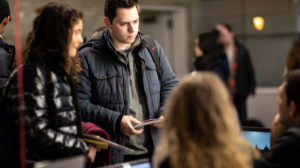Starting a semester at a new university in a new country can be unnerving and overwhelming, especially without knowing any other students. This was my experience when beginning my semester at the University of Exeter in England. I worried about several aspects of studying abroad: Would I like my courses? Will I be able to be successful despite how different the British academic style is? How will I make friends? You may also have these concerns when studying abroad, and that is OK. It is important to realize that it takes a little while to adjust to your new setting, so don’t be too hard on yourself.
Knowing what resources are available helps me feel more comfortable and “in control” in this foreign university. There are over 100 other international students starting their semester abroad at Exeter just like me, so the university’s Global Opportunities Team has provided ample orientation sessions to provide detailed information and support. The team explained how to add and drop modules (translation: courses), academic requirements, health and safety resources, a checklist of administrative tasks we needed to complete, and the Student Guild.
The Student Guild is the university’s student union, and it is the central hub for social activities and societies (translation: clubs). It also provides advice, resources, and representation for students. It is similar to Northeastern’s Student Government Association. To highlight societies and resources and provide social opportunities, the Student Guild organizes Refreshers’ Week in the first week of the spring semester. For international students, this is a great opportunity to learn about all the extracurricular activities the university has to offer. Societies have stalls in the main student center to promote themselves. It is similar to Northeastern’s Activities Fair. At Refreshers’ Week, I spoke with the treasurer of an environmental activist organization called Be the Change. It was exciting to discuss how I could help the university make some environmental improvements. Refreshers’ Week includes several social events and numerous societies have events to welcome students considering joining their society. Attending these events is a casual way to interact with traditional university students. Like in the U.S., sometimes they are “hits” and sometimes they are “misses,” as I have discovered in Exeter. Nonetheless, I am glad to be exploring options. After researching some societies, I was surprised to discover that they usually have membership fees ranging from £5 to £50. You are not required to officially become a member of a society to participate in their activities, though members may receive discounts or other benefits for the activities. Also, some societies behave similarly to American fraternities and sororities. For example, the Politics Society sorts its members into “families” with students of different classes playing the roles of kids and parents. This is similar to how Greek life organizations have “bigs” and “littles.” I have enjoyed learning about different societies and I intend to participate in their events in the coming weeks to determine in which societies I would like to regularly participate. My top picks so far are Be the Change, the Art Society, Politics Society, and the Out of Doors Society.
In addition to the initial orientation session, I attended a session that focused on study skills. Evidently, the ways that universities teach varies by culture. The British teaching style is different from the American teaching style in a few ways. For one, students are expected to conduct more independent study outside of the classroom. Classes generally meet for less time per week than classes in the U.S. While professors provide assigned reading and supplementary reading, they expect students to read widely to understand topics and to inform their written assignments. The assessment formats are slightly different. American courses typically have one or more midterm exams, a final exam, and shorter assignments in between. If not exams, there will be essays or research papers (at least in my Political Science discipline). British modules usually have only two assessments: an essay and an exam, each worth 40% to 60% of the final grade. Even the expectations for writing and referencing are different. Because there is a lot more time for independent study and the final grade weighs heavily on two assessments, personal time management will be critical. Fortunately, the university has an office called Study Zone, which is staffed with people who can help students improve their writing, plan, and better equipped for their studies. The study skills session made me feel more prepared to tackle my modules.
While I gained information about the opportunities and resources at Exeter, I also wanted to socialize and make connections and friendships. The Global Opportunities helped with this by organizing several events for the international students. For example, the trivia quiz night was a blast! I was on a team with three other Americans, one Canadian, one Italian, and two Danes. We ate pot pies as we debated potential answers to questions. We introduced ourselves and shared some laughs. A Facebook group for all the international students had been created by a Swedish student, so I invited my teammates to join. Later in the week, I met up again with some of my teammates at another organized event, a private tour of the Exeter Cathedral. Walking to, from, and through the twelfth-century Anglican cathedral proved to be a nice way to spark new conversations with other international students. I am glad to have had these programs, because they make making friends much easier. In lectures, it is more difficult to spark conversations with other students, particularly with traditional university students and those who already are in groups. I found this challenging in lectures with over 100 students; in smaller seminars, discussion is encouraged. I remind myself though, that it is only the first week. Friendships will be made naturally over the course of the semester. Overall, I am looking forward to socializing more with my teammates for the quiz night. Also, I will meet some new people once I am more involved in societies.
Nearing the end of my first week, my initial nerves have been calmed. I have already made friends, whom I think I will have fun getting to know more. I am excited to attend some society events. I also now know of the resources available to help me have a happy, healthy, and successful academic term. I have high hopes for the rest of this term.










